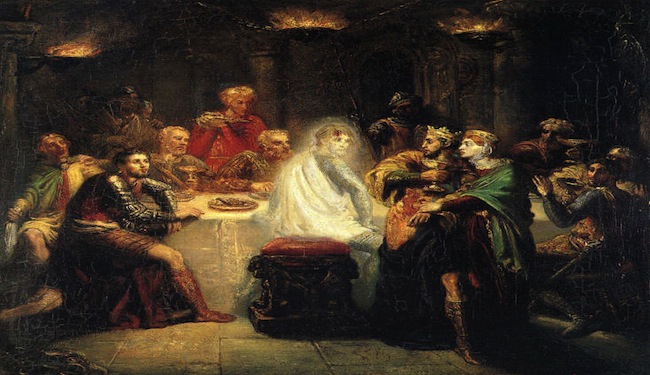Does a moral, psychological “point of no return” exist? Shakespeare illustrates what this turning point might look like in Act III of Macbeth. After killing his king and one of his closest friends, Macbeth, the newly crowned king, announces to his wife,
I am in blood
Stepped in so far that, should I wade no more,
Returning were as tedious as go o’er.
Strange things I have in head, that will to hand,
which must be acted ere they may be scanned.
After this pronouncement, he goes onto slaughter a man’s innocent family in threatened paranoia. The honesty experiments of Dan Ariely, a behavioral economist, confirm that there is such a turning point, which he dubs the “what the hell” effect. In his experiments, he gives his participants many chances to cheat, and for most of the time, they only cheat a little bit. At some point, however, many give up the balancing act and start cheating all the time. It’s similar to dieting, he explains: after you slip up once and eat a cupcake, you are more likely to say, “What the hell, I’ll just eat whatever I want today.”
Interested in figuring out solutions to the phenomenon of dishonesty, Ariely came across the Catholic tradition of confession and was puzzled by it. “From an economic perspective, we don’t understand confession. If you can confess and be absolved, shouldn’t you cheat more?” he asked. What confession offered, he realized, especially for those who had passed the point of no return was the chance to “open a new page.”
He tested this finding through a series of secular confession experiments. Whether people cheated a little or a lot, they were given a chance to say what they did and ask for forgiveness, and if they did, cheating tended to decrease. “How do we get people to feel clean again and act on their goodness?” Ariely asks, wondering how one could transfer the insight of religion into civil society (e.g. bankers asking for forgiveness?)
His experiments tell us that the “point of no return” is not as permanent as it seems. The desire to “feel clean again” is difficult to squash, and what keeps it dormant is less a sunken, evil-loving depravity, but despair that it is too late for one has “stepped in so far.” Hope for forgiveness and a clean slate is far more compelling than further condemnation of sin.
One may dismiss Ariely’s findings as applicable only to low-stake situations and not the high-stake situations involved in criminal justice. Yet it is intriguing that in Rwanda, more than 32,000 perpetrators in the genocide have confessed their deeds through the Umuvumu Tree Project, which brings prisoners and victims together to discuss biblical ideas about confession, forgiveness and repentance, and even, for those who are willing, to pray together. Prior to the project, the government had offered to lighten the sentences for any who confessed, but only 5,000 had done so.
On the see-saw debate on whether we are creatures who are fundamentally good or evil, what Ariely and Rwanda demonstrate is that perhaps we lean towards the latter, but more than anything, we are creatures who are in need of hope.
[Image of Banquo’s ghost from Wikipedia]













